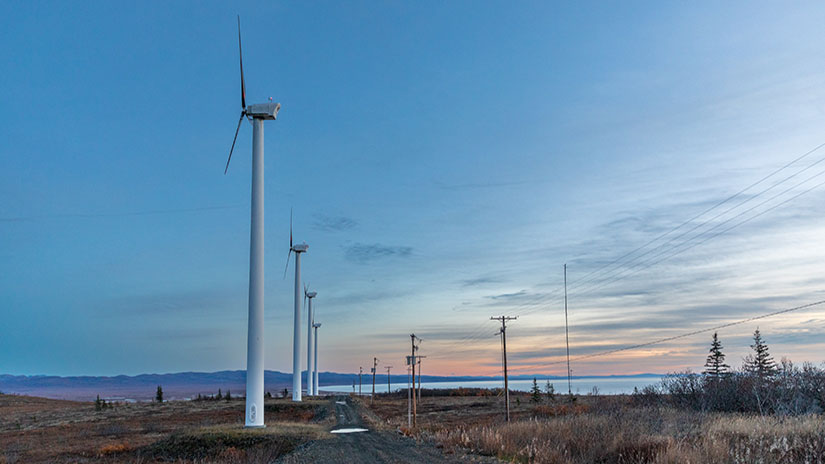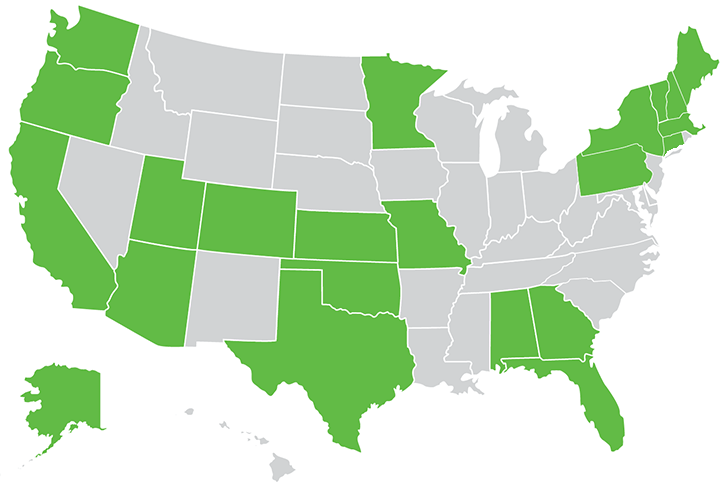Competitiveness Improvement Project
The Competitiveness Improvement Project (CIP) provides financial and technical support to manufacturers of small wind turbines.

Competitiveness Improvement Project Information
The NLR CIP 2025 request for proposals (RFP) has closed.
View the NLR RFP program news article, the recorded informational webinar, and the CIP 2025 RFP materials on sam.gov for more information.
Managed by NLR on behalf of the U.S. Department of Energy (DOE) Wind Energy Technologies Office, CIP awards cost-shared subcontracts and technical support to manufacturers of small and medium-sized wind turbines. Designed to make distributed wind energy technologies more cost-competitive and reliable, these awards help manufacturers of wind turbines less than 1 MW in capacity to:
- Optimize their designs
- Develop advanced manufacturing processes
- Perform turbine and component testing and certification
- Expand access to distributed wind technology.
The goals of CIP are to make wind energy cost-competitive with other distributed generation technologies and increase the number of wind turbine designs tested and certified to national standards. Guidance on turbine and component certification can be found in the Distributed Wind Certification Best Practices Guideline. Past request for proposal materials can be found at sam.gov for reference.
Competitiveness Improvement Project
Since 2012, NLR has awarded:
private-sector investment
The Competitiveness Improvement Project supports companies from across the nation.

Why the U.S. Department of Energy Invests in the Competitiveness Improvement Project
Cost reductions, more reliable technologies, and consumer-friendly business models are making distributed energy generation more accessible to businesses and consumers interested in producing their own electricity. DOE investments in CIP support U.S. leadership in distributed wind energy technologies and advance wind energy as a low-cost distributed generation technology option by:
- Reducing technology costs
- Supporting new product innovation
- Optimizing wind turbines for distributed applications
- Ensuring that distributed energy consumers have American-made technology options that are certified for performance and quality.
The Competitiveness Improvement Project's Impact
NLR has awarded 77 subcontracts to 30 companies, totaling $18.5 million of DOE funding, while leveraging $11.2 million in additional private-sector investment since CIP began in 2012.
During that time, CIP has helped more than two dozen small American businesses across the United States develop new and innovative distributed wind energy technology. CIP projects have made distributed wind energy more cost-competitive, improved its interoperability with other distributed energy resources, and increased the number of small- and medium-scale wind turbine designs tested to national standards.
$665K
$20M
$1.5M
$1.1M
$1.8M
$1.4M
$2.9M
$3.7M
$3.5M
$4.4M
$6.5M
Common Award Topics and Recent Project Examples
NLR has conducted requests for proposals for the following award topics. Examples of projects funded in each topic are included. The selection of topics is guided by available funds and input from the wind energy industry about specific areas of concern. Each CIP solicitation cycle may not include every category.
These projects focus on moving original concepts from the preliminary design phase to development of a production prototype that can be evaluated. The goal is to develop a final prototype wind turbine design ready for manufacturing and prototype testing.
Learn about:
These projects support the manufacturing of a full-scale prototype of the wind turbine system that is ready for prototype testing.
Learn about:
These projects validate a prototype wind turbine to determine the commercial readiness of the turbine system. These results are intended to confirm turbine designs or improvements that are ready for certification testing.
Learn about:
These projects support innovation in existing components—such as controllers, inverters, alternators, rotor blades, or towers—to lower costs and/or improve production. Projects can also include development of turbine components that will allow the wind turbine to enter new market areas.
Learn about:
Carter Wind Turbines' 2022 project
Bergey Windpower's 2021 project
Siva Powers America's 2021 project
These projects support improvements in existing wind energy generator designs to optimize the full system or a subsystem of components, leading to a reduced levelized cost of energy.
Learn about:
XFlow Energy Company’s 2022 project
These projects apply to turbines up to 150 kW peak power seeking certification to ANSI/ACP 101-1-2021 The Small Wind Turbine Standard. The effort may also include work to List the turbine assembly or component(s) to applicable electrical safety standards.
Learn about:
Eocycle America Corporation's 2022 project
Ryse Energy LLC – Americas' 2022 project
These projects apply to turbines up to 1 MW rated power seeking type certification through the IECRE System (IEC System for Certification to Standards Relating to Equipment for Use in Renewable Energy Applications). The effort may also include work to list the turbine assembly or component(s) to applicable electrical safety standards.
These projects address the need for listed inverters built and tested specifically for small- and medium-scale wind turbines.
These projects support designing, building, and validating improved manufacturing processes for a defined production of a wind turbine, leading to a reduced levelized cost of energy.
Learn about:
One of 10 types of CIP awards, technology commercialization projects address the risks to commercialization of distributed wind technology and fund the development of tools, business models, and partnerships designed to improve technology access.
Learn about:
2024 Competitiveness Improvement Project Informational Workshop
Designed for distributed wind energy technology suppliers interested in applying to CIP solicitations in 2025, NLR hosted a 2-day virtual workshop in December 2024. Speakers provided an overview of the CIP process, topic areas, evaluation criteria, certification and testing requirements, and technical support opportunities.
Access the following workshop recordings for topic area presentations and discussions, examples of past projects, guidance on choosing the appropriate topic area, and tips for preparing successful proposals and reports.
View Day 1 of the 2024 CIP Informational Workshop on YouTube and workshop presentations, which include:
- Welcome/Introductions Ian Baring-Gould, Distributed Wind Platform Lead (NLR)
- Overview of CIP, Brent Summerville (NLR)
- Overview of Potential Topic Areas
- Prototype Design Development, Dave Snowberg (NLR)
- Prototype Manufacture and Installation, Scott Dana (NLR)
- Prototype Installation and Testing, Scott Dana
- Component Innovation and System Optimization, Ian Baring-Gould
- Small Wind Certification and/or Listing, Brent Summerville
- Inverter Listing, Lee Jay Fingersh (NLR)
- Type Certification and Listing, Jeroen van Dam (NLR)
- Manufacturing Process Innovation, Dave Snowberg
- Product Commercialization and Market Development, Ruth Baranowski (NLR)
- Overview of Turbine Testing and Certification, Brent Summerville, Shawn Martin (ICC-SWCC), Jeroen van Dam, Dean Davis, Windward Engineering
View Day 2 of the 2024 CIP Informational Workshop on YouTube and day 2 workshop presentations, which include:
- Turbine, Component and Inverter Listing, Joe Spossey (REInnovations)
- Design Review/Evaluation, Dave Snowberg
- Procurement/Contracting, Kyndall Jackson (NLR)
- Additional CIP Considerations
- Opportunities for technical assistance, Scott Dana
- Overview of deliverables and outreach materials, Brent Summerville
- Levelized cost of energy tool, Brent Summerville
- CIP Discussion, Ian Baring-Gould, Brent Summerville
Contact
Share
Last Updated Dec. 24, 2025
